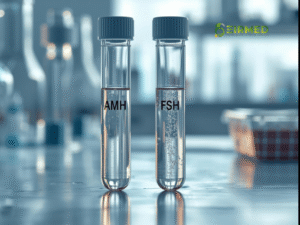AMH and FSH Testing: 8 Effective Insights That Support Fertility

8 Questions to Ask Your Doctor About AMH and FSH Testing
8 Questions to Ask Your Doctor About AMH and FSH Testing can provide you with essential insights into your reproductive health. If you are considering family planning or experiencing difficulties in conceiving, understanding tests like the AMH blood test and FSH blood test levels is crucial. At EIRMED, our fertility and infertility-focused website offers a range of medicines and treatment-based products for both male and female fertility needs. This comprehensive guide explores the AMH test, FSH testing, and related procedures in depth, helping you prepare for informed discussions with your healthcare provider.
Introduction to AMH and FSH in Fertility Assessment
 Fertility evaluation often begins with hormone tests that reveal important details about your reproductive potential. The AMH test, known fully as the anti-Mullerian hormone test, is a key tool in this process. Produced by granulosa cells in ovarian follicles, AMH reflects the number of remaining eggs, or ovarian reserve. Unlike other tests, the AMH blood test can be performed at any time during your menstrual cycle, making it highly convenient for busy schedules.
Fertility evaluation often begins with hormone tests that reveal important details about your reproductive potential. The AMH test, known fully as the anti-Mullerian hormone test, is a key tool in this process. Produced by granulosa cells in ovarian follicles, AMH reflects the number of remaining eggs, or ovarian reserve. Unlike other tests, the AMH blood test can be performed at any time during your menstrual cycle, making it highly convenient for busy schedules.
In contrast, FSH, or follicle-stimulating hormone, plays a vital role in regulating the menstrual cycle in women and sperm production in men. In females, FSH stimulates the growth of ovarian follicles each month, leading to egg maturation. High FSH blood test levels may indicate that the ovaries are struggling to respond, often signaling a diminished ovarian reserve.
For males, FSH stimulates which cells of the testes to produce ABP (androgen-binding protein), specifically the Sertoli cells, which support sperm development.
This makes FSH testing relevant for both genders when investigating infertility causes.
Combining these, such as through test FSH and LH (luteinizing hormone), provides a more complete picture. LH works alongside FSH to trigger ovulation in women and testosterone production in men. At EIRMED, we recognize the importance of these hormones and offer products like hormone-balancing supplements to support your fertility journey.
Why Consider AMH Testing for Ovarian Reserve
 AMH testing has become a standard in fertility clinics because it offers reliable insights into egg quantity without invasive procedures. The AMH anti-Mullerian hormone test measures hormone levels in the blood, helping predict how well your ovaries might respond to stimulation during treatments like in vitro fertilization (IVF).
AMH testing has become a standard in fertility clinics because it offers reliable insights into egg quantity without invasive procedures. The AMH anti-Mullerian hormone test measures hormone levels in the blood, helping predict how well your ovaries might respond to stimulation during treatments like in vitro fertilization (IVF).
For women planning to delay childbearing or those with conditions like endometriosis, this test is particularly valuable.
A normal AMH level varies by age: for women in their 20s to early 30s, it’s often between 2.0 and 4.0 ng/mL, indicating a healthy reserve.
Levels below 1.0 ng/mL might suggest a lower reserve, but it’s important to note that low AMH does not definitively mean infertility—many women conceive successfully despite this.
Factors like smoking, obesity, or genetic predispositions can influence AMH, so lifestyle adjustments may help maintain levels.
The lab test AMH is straightforward: a healthcare professional draws a small blood sample, which is then analyzed in a laboratory. Results are typically available within a few days, allowing for quick follow-up discussions.
Understanding AMH Test Cost and Accessibility
One practical aspect to consider is the AMH test cost, which can range from $50 to $200 depending on the laboratory, location, and whether it’s part of a broader fertility panel.
AMH test charges may be covered by insurance if deemed medically necessary, such as in cases of suspected polycystic ovary syndrome (PCOS) or premature ovarian insufficiency. Always inquire about AMH hormone test cost upfront to avoid surprises.
At EIRMED, we aim to make fertility care more accessible by providing affordable products that complement testing, such as at-home monitoring kits for hormone levels.
The Procedure for AMH Hormone Blood Test
The AMH hormone blood test requires no special preparation—you can eat, drink, and take most medications as usual. A phlebotomist will insert a needle into a vein in your arm to collect the sample, a process that takes just minutes with minimal discomfort. Bruising is rare, but if it occurs, it’s usually mild and resolves quickly.
This test’s flexibility sets it apart from cycle-dependent ones, allowing you to schedule it conveniently. If you’re undergoing fertility treatments, your doctor might recommend repeating the AMH hormone blood test periodically to track changes.
Exploring FSH Blood Test Levels and Their Meaning
The meaning of FSH test is tied to its role in reproductive health. In women, FSH blood test levels are measured early in the menstrual cycle (days 2-5) when they should ideally be below 10 mIU/mL.
Elevated levels, such as above 15 mIU/mL, could point to challenges like perimenopause or ovarian dysfunction, impacting fertility by suggesting fewer responsive eggs.
For men, normal FSH blood test levels range from 1.5 to 12.4 mIU/mL.
High levels might indicate testicular issues, while low levels could signal problems with the pituitary gland. Since FSH stimulates which cells of the testes to produce ABP, imbalances can affect sperm quality and quantity, leading to male infertility.
An FSH urine test is available as an at-home option for preliminary screening, but it’s less precise than blood tests and should be confirmed professionally.
Combining Test FSH and LH for Comprehensive Insights
Often, doctors recommend test FSH and LH together because these hormones interact closely. In women, a high FSH-to-LH ratio might indicate PCOS, while in men, it could highlight hypogonadism.
This paired testing helps tailor fertility treatments more effectively.
Preparing for Your AMH and FSH Testing Appointment
To get the most from your tests, prepare by tracking your menstrual cycle, noting any symptoms like fatigue or irregular periods, and listing medications. For FSH, ensure the timing aligns with your cycle’s early phase. Bring questions about potential outcomes to make the visit productive.
8 Questions to Ask Your Doctor About AMH and FSH Testing
 Engaging actively with your doctor ensures you understand your results fully. Here are 8 Questions to Ask Your Doctor About AMH and FSH Testing, structured to cover key aspects.
Engaging actively with your doctor ensures you understand your results fully. Here are 8 Questions to Ask Your Doctor About AMH and FSH Testing, structured to cover key aspects.
What Do My AMH Blood Test Results Indicate About My Ovarian Reserve?
Discuss how your AMH anti-Mullerian hormone test levels correlate with egg quantity and age-related expectations. Ask for comparisons to norms and implications for natural conception or assisted reproduction.
How Should I Interpret My FSH Blood Test Levels?
Inquire about the meaning of FSH test in your context, whether high levels suggest diminished reserve in women or testicular concerns in men, and what follow-up tests might be needed.
When Is the Optimal Time for AMH Testing or FSH Testing?
While AMH hormone blood test is cycle-independent, FSH requires specific timing. Ask if your current health status warrants immediate testing or monitoring over time.
What Are the AMH Test Charges and Coverage Options?
Clarify AMH test cost and AMH hormone test cost, including lab fees and insurance possibilities, to plan financially.
Can Lifestyle Factors Influence AMH Hormone Test or FSH Results?
Explore if diet, exercise, or avoiding toxins could positively affect your levels, supporting overall fertility.
How Do Test FSH and LH Results Complement Each Other?
Understand how combining these tests provides deeper insights into hormonal balance and fertility challenges for both genders.
What If My Lab Test AMH Shows Low Levels?
Ask about options like lifestyle changes, supplements, or advanced treatments if results indicate reduced reserve.
Is an FSH Urine Test a Viable Alternative to Blood Testing?
Discuss the reliability of FSH urine test for initial screening and when a blood test is preferable for accuracy.
These 8 Questions to Ask Your Doctor About AMH and FSH Testing empower you to make informed decisions about your reproductive health.
Benefits of Undergoing AMH and FSH Testing
Knowledge from these tests allows early intervention, such as egg freezing for low AMH or hormone therapy for imbalanced FSH. They reduce anxiety by providing data-driven insights, helping couples plan families effectively.
At EIRMED, our products, including fertility enhancers, align with these findings to support your goals.
Common Myths Surrounding AMH and FSH Testing
A prevalent myth is that low AMH guarantees infertility—not true, as quality matters alongside quantity.
Another is that high FSH always means menopause; it can fluctuate and improve with treatment. FSH urine tests are sometimes overhyped as equivalents to blood tests, but they lack precision.
Next Steps Following Your Test Results
If results raise concerns, consult a specialist for personalized plans. Monitor lifestyle impacts and consider retesting. EIRMED provides resources like male fertility boosters if FSH issues affect sperm production.
FAQ
What is the AMH test and how is it performed?
The AMH test, or AMH anti-Mullerian hormone test, is a blood draw to measure ovarian reserve. It’s simple, with no cycle timing required.
How much does the AMH hormone test cost?
AMH test charges vary, typically $50 to $200. Check with providers for AMH test cost and insurance details.
What do FSH blood test levels mean for fertility?
The meaning of FSH test involves assessing hormone response; high levels may indicate lower reserve in women or testicular issues in men.
Why test FSH and LH together?
Test FSH and LH provides a fuller view of reproductive hormones, aiding in diagnosing conditions like PCOS or hypogonadism.
What role does FSH play in male fertility?
FSH stimulates which cells of the testes to produce ABP, supporting sperm maturation in Sertoli cells.
Overall Purpose
This article on 8 Questions to Ask Your Doctor About AMH and FSH Testing delivers detailed knowledge on key fertility tests. It covers AMH blood test procedures, FSH blood test levels interpretations, costs, and implications for both women and men. By integrating these insights, you can engage effectively with your doctor and explore options. EIRMED offers targeted products to enhance your fertility efforts. Empower yourself with this information for better reproductive health decisions.
Disclaimer
This content is provided for informational purposes only and does not constitute medical advice. Consult a qualified healthcare professional for personalized recommendations regarding AMH testing, FSH blood test levels, or any fertility concerns. EIRMED does not diagnose, treat, or guarantee outcomes from tests like AMH hormone blood test or FSH urine test. Individual results vary, and professional interpretation is essential. We assume no liability for actions taken based on this article.
Thank You
Thank you for taking the time to read this in-depth guide on 8 Questions to Ask Your Doctor About AMH and FSH Testing. At EIRMED, we are dedicated to supporting your fertility needs with high-quality products and information. We appreciate your trust and invite you to explore our site for more tools to aid your journey.

Eirmed is an informational platform dedicated to providing reliable, science-based insights on male and female fertility, reproductive health, and natural conception.
